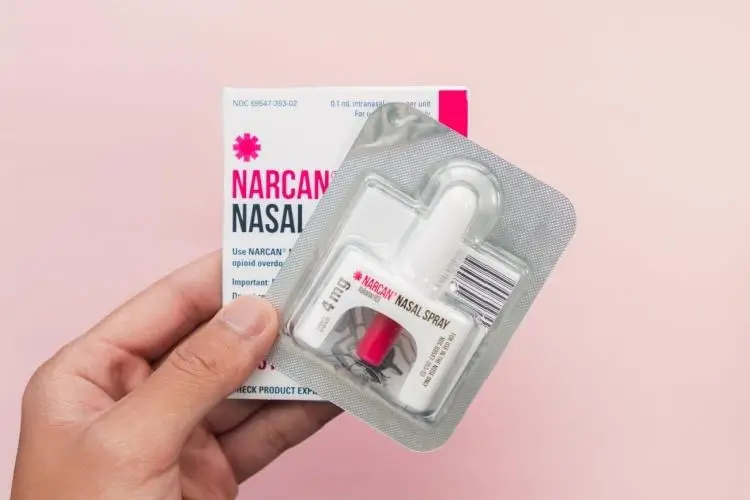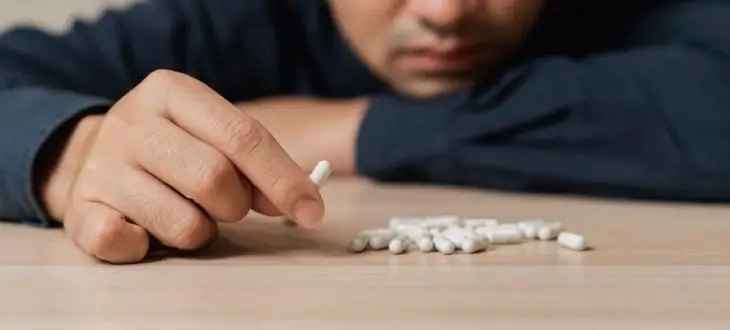Signs of Fentanyl Use & What to Do
Fentanyl is the leading cause of fatal drug overdose in the United States. In 2022, Fentanyl was involved in more than 72,000 overdose-related deaths, and the problem is getting worse. In 2023, the state of California alone seized enough fentanyl to kill the entire population of the world “nearly twice over.”
To prevent further fentanyl-related deaths, it is critically important that you are aware of how to recognize the signs of fentanyl use and overdose.
Read more to find out what fentanyl is, and the signs of fentanyl use, addiction, and overdose.
There is hope!
Download our free Addiction Recovery Guide for Families and learn about addiction, how it’s treated, and how to heal for a more meaningful life.
What Is Fentanyl?
Fentanyl is an incredibly powerful man-made opioid. Although fentanyl is chemically similar to morphine and heroin, it is about 100 times stronger than morphine and 50 times stronger than heroin.
Fentanyl is a legal prescription drug that is used as an anesthetic and analgesic (pain killer). Brand names for prescription fentanyl include Actiq, Duragesic, and Sublimaze. However, fentanyl is commonly misused and is illegally manufactured and imported for this purpose.
Tragically, fentanyl abuse is on the rise in the United States. The number of fatal fentanyl overdoses grew by 279% between 2016 and 2021, and every year since has seen that number grow. Fatal overdose rates for male victims are about 2.5 higher than those for female victims.
10 Warning Signs of Fentanyl Use

There are some common or especially telling signs of fentanyl use that you should be aware of. It is important to note that these symptoms can apply to someone who purposefully or unknowingly took fentanyl (for example, someone who unknowingly took a drug that was laced with fentanyl).
Here are 10 warning signs someone could be on fentanyl:
- Sudden Changes in Behavior/Mental State: Fentanyl use can cause extreme mood swings, unexplained aggression, sudden lethargy, and erratic behavior.
- Isolation and Withdrawal: Fentanyl can make users want to be alone, because of the effects of the drug or feelings of shame over substance use.
- Financial Issues: The high cost of obtaining fentanyl can cause financial issues and ultimately, loss of employment. This often takes the form of unexplained financial strain and frequently borrowing money.
- Neglect of Responsibilities: Fentanyl use can lead to a neglect of personal, professional, familial, financial, and legal responsibilities, including declines in performance, absenteeism, or lack of interest in previously enjoyed activities.
- Physical Appearance Changes: Fentanyl use can cause immediate changes like pinpoint pupils, slurred speech, and impaired coordination. Long-term changes include weight loss, deterioration in personal hygiene, and a general decline in physical appearance.
- Drug Paraphernalia: Paraphernalia associated with fentanyl use may include syringes, needles, burnt spoons, empty prescription bottles, and small plastic bags.
- Medical Issues: Fentanyl use can lead to respiratory issues, dizziness, and falling asleep unexpectedly. Medical attention should be sought immediately if these fentanyl signs and symptoms are present.
- Unpredictable Sleep Patterns: Insomnia, excessive drowsiness, and erratic sleep patterns are indicative of fentanyl misuse.
- Cognitive Signs: An inability to concentrate, cognitive impairment, memory lapses, and impaired judgment are all signs of fentanyl use.
- Track Marks or Injection Sites: People who inject fentanyl often have visible track marks or injection sites on the arms, between the toes, or on other body parts.
Signs of Fentanyl Overdose
Recognizing the signs of fentanyl overdose can save lives.
Dial 911 if you see someone exhibiting these signs of fentanyl overdose:
- Extreme drowsiness or lethargy
- Unconsciousness and unresponsiveness
- Pinpoint pupils
- Cold and clammy skin
- Limp body
- Shallow, slow, or absent breathing
- Blue, bluish, grey, or pale skin, especially around the lips or fingertips
- Inability to respond or be awoken
If you suspect a fentanyl overdose, do the following:
- Administer Narcan/Naloxone.
- Call 911 or other emergency services.
- Keep the victim awake and breathing.
- Lay the person on their side to prevent choking.
- Stay with the person until first responders arrive.
- Provide honest and complete information to medical professionals.
Naloxone Saves Lives

One study found bystanders were present in more than 33% of overdoses from opioids. If you find yourself in this scary situation, you can save a life as long as you have the proper tools.
Naloxone (Narcan) is a life-saving medication that can reverse an opioid overdose, including a fentanyl overdose. Naloxone is available to anyone—no prescription or medical training required. It has two forms: a nasal spray and an injectable form. Both are safe and effective at saving lives.
Naloxone is not harmful if an individual is not overdosing or if they are overdosing on drugs other than opioids. So, it is always better to use Naloxone if you think someone could be overdosing on fentanyl, even if you’re not 100% certain.
You can get naloxone for free in all 50 states. Doctors frequently co-prescribe naloxone along with high-potency opioids, but you can also get naloxone at pharmacies, community-based naloxone programs, and most syringe service programs.
Signs of Fentanyl Addiction
Fentanyl addiction is a diagnosable disease which is characterized by strong cravings, a physical and mental dependence on the drug, negative consequences because of fentanyl use, and a high likelihood of relapse.
Please note that only a trained medical or addiction treatment professional can properly diagnose a fentanyl addiction.
Some of the most common signs of fentanyl addiction include:
- Increased fentanyl tolerance (needing more fentanyl to experience the same effects)
- Experiencing withdrawal symptoms when fentanyl use is discontinued or reduced, including anxiety, nausea, sweating, or restlessness
- Spending a significant amount of time obtaining, using, or recovering from fentanyl
- Neglecting personal, professional, financial, or other responsibilities
- Continuing to use fentanyl despite experiencing negative consequences
- Failed attempts to quit using fentanyl
- Loss of interest in previously enjoyed activities
- Social isolation
- Engaging in secrecy or deception, especially lying about fentanyl use
- Deteriorating health or physical appearance
If you or someone you love is showing signs of fentanyl addiction, the best course of action is to contact a professional, get a proper diagnosis, and enter a treatment program.
Short- and Long-Term Effects of Fentanyl Use

Some of the most common and/or concerning short-term effects of fentanyl use include:
- Feelings of euphoria and relaxation
- Confusion, dizziness, and impaired coordination
- Nausea, vomiting, and gastrointestinal distress
- Hypotension, or abnormally low blood pressure
- Constricted, pinpoint pupils
- Extreme sedation
- Respiratory depression
- Rapid and unpredictable mood swings
- Overdose and death
Some of the most serious long-term effects of fentanyl use include:
- Physical dependence, where the body has become so accustomed to the presence of fentanyl that the user experiences withdrawal symptoms when they aren’t using
- Fentanyl use disorder or addiction
- Chronic health issues such as respiratory issues, cardiac complications, and liver damage
- Impaired cognitive function, including issues with memory, attention, and decision making
- Social and occupational dysfunction, including strained relationships, job loss, divorce, and arrest, among many others
- Organ damage, including damage to the liver, kidneys, and heart
- Weakened immune system and increased susceptibility to illness
- Legal consequences such as arrest and imprisonment
What to Do If You Think Your Loved One Is Addicted to Fentanyl

Because fentanyl is so deadly, it is important that you take action immediately if you think your loved one is suffering from a fentanyl addiction. Otherwise, their life may be at risk.
Here are some steps you can take if you have recognized the signs of fentanyl use in your loved one.
- Educate yourself about fentanyl addiction.
- Research available treatment options.
- Choose a calm and private time and place to have a conversation.
- Express your concerns in a supportive and non-judgmental manner.
- Remain compassionate and refrain from placing blame.
- Encourage professional help.
- Discuss finances, insurance, and other potential barriers to treatment.
- Avoid enabling behavior.
- Set clear, healthy boundaries and rules and enforce them with consequences.
- Host a professionally-mediated intervention with family and friends.
- Help them find and attend a rehab program.
- Participate in their treatment where appropriate, including family therapy.
- Provide active, appropriate, and healthy support during their recovery.
- Actively practice self-care, and seek support if necessary.
- Be patient and aware that setbacks are a part of the recovery process.
Don’t Let Fentanyl Take Another Life
Fentanyl kills tens of thousands of Americans every year, but your loved one doesn’t have to be another number.
Legacy Healing is dedicated to helping people overcome fentanyl addiction using our holistic approach that treats the mind, body, and soul. We use the right psychotropic medications, cutting-edge clinical therapies, and a compassionate community of like minded individuals to help people find sobriety and live the life they deserve.
Call 888-534-2295 today to speak with a treatment staff member about how we can help your loved one break free from fentanyl.
Signs of Fentanyl Use FAQs
What are the warning signs of fentanyl use?
Common or telltale signs of fentanyl use include drastic behavior changes, social isolation, financial issues, neglect of personal, professional, and familial responsibilities, changes in physical appearance, drug paraphernalia, medical problems, unpredictable sleep patterns, and track marks or injection sites.
How can I recognize if someone is using fentanyl?
There are many ways to tell if someone is using fentanyl. Physical signs to look for include pinpoint pupils, bluish or pale lips or fingertips, changes in physical appearance, falling asleep at odd times, track marks, and difficulty breathing.
Behavioral changes to look for include neglecting responsibilities, no longer participating in previously enjoyed activities, unusual sleep patterns and behaviors, loss of interest or energy, isolation from others, and frequent or severe mood swings.
Other signs include unexplained financial problems, the appearance of drug paraphernalia, and legal issues.
What are the dangers of fentanyl abuse?
There are many short-term and long-term dangers of fentanyl abuse.
Short-term dangers of fentanyl misuse include:
- Sedation
- Nausea
- Vomiting
- Confusion
- Injury
- Respiratory depression
- Overdose
- Death
Long-term dangers of fentanyl abuse include:
- Organ damage
- Cognitive impairment
- Social, familial, professional, financial, and legal consequences
- Mood swings and other behavioral changes
- Tolerance
- Dependence
- Addiction
- Respiratory and cardiovascular damage
- Immune system damage and infectious disease
- Death
How can fentanyl overdose be prevented?
If a fentanyl overdose is already occurring, it can be reversed if Naloxone/Narcan is administered in time. The combination of Naloxone and immediate medical intervention can prevent death.
However, the only way to fully prevent fentanyl overdose is to completely avoid using fentanyl altogether. Although it is possible to stop using fentanyl on your own, the chances of achieving a successful, lasting recovery are greatest if you seek out professional treatment, and ideally attend an inpatient rehab program.
Where can I find help for fentanyl addiction?
Finding help for fentanyl addiction may seem intimidating, but recognizing and admitting that you need help is the first and most important step. Healthcare professionals, licensed therapists, and addiction specialists are the primary sources of professional help. However, support groups, community groups, non-profit organizations, and religious organizations can also help with fentanyl addiction.
If you’re looking for immediate help for fentanyl addiction, call 888-534-2295 today to speak with the staff at Legacy Healing Center. They will be able to answer all of your questions.
Sources
- New York State. (N/A). Substance Use Disorder Warning Signs.
- National Institute on Drug Abuse. (2021). Fentanyl DrugFacts.
- Centers for Disease Control and Prevention. (2023). Fentanyl Facts.
- California Statewide Opioid Safety Workgroup. (N/A). Responding to a Fentanyl Overdose: What California First Responders Need to Know.
- Centers for Disease Control and Prevention. (N/A). Lifesaving Naloxone.
- DEA Street. (2023). Enduring Threats.
- Los Angeles Times. (2024). California Seized Enough Fentanyl Last Year to Kill Everyone in the World “Nearly Twice Over.
- Drugs.com. (2022). How Does Fentanyl Compare to Heroin or Other Opiates.
- Centers for Disease Control and Prevention. (2023). Fentanyl Overdose Death Rates More than Tripled from 2016 to 2017.



